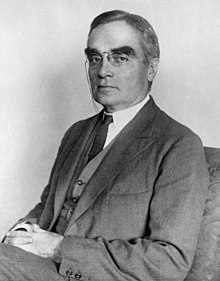Learned hand
Billings Learned Hand (born January 27, 1872 in Albany , New York , † August 18, 1961 ) was an American judge and legal scholar . He served 37 years at the United States Court of Appeals for the Second Circuit (1924–1961) and is considered one of the most influential American legal philosophers and lawyers of the 20th century. His writings have been cited more frequently in judgments of the United States Supreme Court than any other judge who has not served on the Supreme Court, and his reputation has been surpassed by a few judges in the Supreme Court.
He owed his unusual first name to a special family tradition: in his mother's family (whose maiden name was Learned and had an uncle named Billings) surnames were always given as first names. He studied at Harvard with philosophers such as William James , Josiah Royce and George Santayana . In 1893 he received his bachelor's and master's degrees and in 1896 his LL.B. He was then from 1897 lawyer in Albany and from 1902 in New York City. In 1909 he became a federal judge (Federal District Judge at the District Court of the Southern District of New York) and from 1924 he was a judge in the second district of the United States Court of Appeal, where he was presiding judge (Chief judge) in 1939. His 52-year tenure as a federal judge is a record. Although he officially retired in 1951, he was still active as a judge (with senior status) until his death in 1961.
Some of his decisions made American legal history, for example in the anti-trust case Alcoa (United States vs. Aluminiaum Company of America 1945) and in several proceedings in the early 1950s that fell during the anti-communist climate of the Cold War and the McCarthy era. Learned Hand was hostile to McCarthy and his inquisitorial communist hunt, but held back publicly because of his role as judge until his official retirement in 1951. On the other hand, he upheld a 1951 verdict against the General Secretary of the Communist Party Eugene Dennis that deprived him of the rights of free speech because he would advocate the forcible removal of the US government. That was done using the Smith Act of 1940 and the hand judgment was also upheld by the Supreme Court in 1951. In 1950 he upheld the appeal of the convicted communist spy Judith Coplin because the prosecutors, the FBI, had not disclosed all wiretapping measures (and even lied about them under oath) and a search had taken place without a judicial decision.
In Germany he was also known for being a judge in the “Bayer Co. v. United Drug Co. " in 1921 the brand name Aspirin released because it had become in the United States a generic name for aspirin-containing medications.
He was a good writer and known to the public for his speeches (collected in 1952 in his book The spirit of liberty ). The title of his book alludes to his most famous speech in Central Park, New York on May 21, 1944 (on the occasion of I am American day in front of an audience of millions, where new citizens were sworn in, in this case 150,000), which made him widely known and put the defense of liberty in the hands of every American citizen:
What is the spirit of freedom? I cannot define it, I can only express my own convictions. The spirit of freedom is the belief that is not too sure that it is correct, the spirit of freedom seeks to understand the opinions of other men and women. The spirit of freedom weighs their interests against its own without prejudice. The Spirit of Freedom is a reminder that not even a sparrow falls unnoticed from the sky. The Spirit of Freedom is His Spirit, who nearly two thousand years ago taught mankind the lesson they never learned but never forgot: that there could be a kingdom in which the least is heard and considered equal to the greatest.
He had been proposed as a candidate for Supreme Court judge several times, most recently in 1942, but he was too old for Franklin D. Roosevelt by then.
In 1933 he was elected to the American Academy of Arts and Sciences .
literature
- Gerald Gunther: Learned Hand. The man and the judge , Knopf 1994
Web links
Individual evidence
- ↑ a b Article (Billings) Learned Hand, Britannica Concise Encyclopedia 2006
- ^ Learned Hand , Federal Judicial Center
- ↑ Bayer Co. v. United Drug Co. , 272 F. 505 (SDNY 1921), 1921-04-21
- ^ What then is the spirit of liberty? I cannot define it; I can only tell you my own faith. The spirit of liberty is the spirit which is not too sure that it is right; the spirit of liberty is the spirit which seeks to understand the minds of other men and women; the spirit of liberty is the spirit which weighs their interests alongside its own without bias; the spirit of liberty remembers that not even a sparrow falls to earth unheeded; the spirit of liberty is the spirit of Him who, near two thousand years ago, taught mankind that lesson it has never learned, but has never quite forgotten; that there may be a kingdom where the least shall be heard and considered side by side with the greatest. Digital history
| personal data | |
|---|---|
| SURNAME | Hand, Learned |
| ALTERNATIVE NAMES | Hand, Billings Learned (full name) |
| BRIEF DESCRIPTION | American judge and lawyer |
| DATE OF BIRTH | January 27, 1872 |
| PLACE OF BIRTH | Albany , New York |
| DATE OF DEATH | August 18, 1961 |
